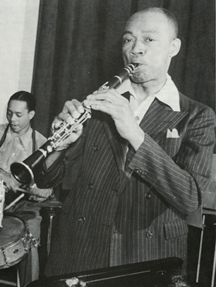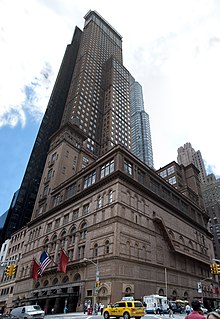
Albany Leon "Barney" Bigard was an American jazz clarinetist known for his 15-year tenure with Duke Ellington. He also played tenor saxophone.

Weldon Leo "Jack" Teagarden was a jazz trombonist and singer. According to critic Scott Yannow of Allmusic, Teagarden was the preeminent American jazz trombone player before the bebop era of the 1940s and "one of the best jazz singers too". Teagarden's early career was as a sideman with the likes of Tommy Dorsey, Paul Whiteman and lifelong friend Louis Armstrong before branching out as a bandleader in 1939 and specializing in New Orleans Jazz-style jazz until his death.
The Hot Five was Louis Armstrong's first jazz recording band led under his own name.
"West End Blues" is a multi-strain twelve-bar blues composition by Joe "King" Oliver. It is most commonly performed as an instrumental, although it has lyrics added by Clarence Williams.

Jon Faddis is an American jazz trumpet player, conductor, composer, and educator, renowned for both his playing and for his expertise in the field of music education. Upon his first appearance on the scene, he became known for his ability to closely mirror the sound of trumpet icon Dizzy Gillespie, who was his mentor along with pianist Stan Kenton and trumpeter Bill Catalano.

Clyde Lanham Hurley, Jr. was a trumpeter during the big band era. He was born in Fort Worth, Texas to Clyde Lanham Hurley and Esther Brown. Scott Yanow describes Hurley as "a fine trumpeter with a fat tone and a hard-driving style". He died of a coronary occlusion in Fort Worth leaving two sons and a former wife.
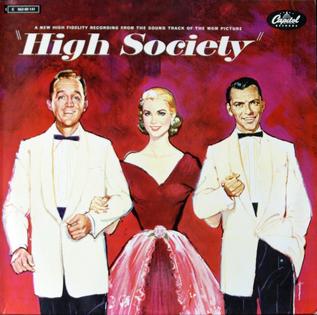
High Society is a 1956 soundtrack album, featuring Bing Crosby, Frank Sinatra, Louis Armstrong and Grace Kelly. This was Crosby's fifth LP album, and his first recorded for Capitol Records. It was the soundtrack for the MGM feature film High Society, also released in 1956. Initially issued on vinyl either in mono or stereo format, the album has been issued on CD by Capitol in Japan in 1991 and by Capitol in the UK in 1995. The album was also included in a 3-CD box set called "Original Soundtrack Recordings" issued by the EMI Music Group Australasia

"When You're Smiling" is a popular song written by Larry Shay, Mark Fisher and Joe Goodwin in 1928. Early popular recordings were by Seger Ellis (1928), Louis Armstrong (1929), and Ted Wallace & His Campus Boys (1930).
"Now You Has Jazz" is a song written by Cole Porter for the 1956 film High Society, where it was introduced by Bing Crosby and Louis Armstrong. The song describes what instruments are needed to create jazz.
Dick Cary was an American jazz trumpeter, composer and arranger.

The Carnegie Hall Concerts: December 1947 is a live album by American pianist, composer and bandleader Duke Ellington recorded at Carnegie Hall, in New York City in 1947 and released on the Prestige label in 1977.
Dan Terry was an American big band leader, arranger, and trumpet and flugelhorn player who appeared at Birdland, the world-famous jazz club, with Dinah Washington, Sarah Vaughan, Chris Connor, Johnny Smith, and other jazz luminaries.
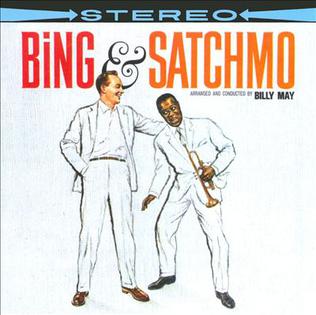
Bing & Satchmo is a 1960 studio album by Bing Crosby and Louis Armstrong that was arranged and conducted by Billy May. The album was recorded for Crosby's label, Project Records, and released by MGM.
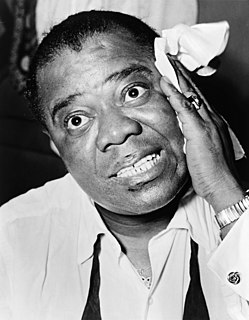
Louis Armstrong (1901–1971), nicknamed Satchmo or Pops, was an American trumpeter, composer, singer and occasional actor who was one of the most influential figures in jazz and in all of American popular music. His career spanned five decades, from the 1920s to the 1960s, and different eras in jazz.

Out of the Storm is the debut album led by American drummer Ed Thigpen recorded in 1966 for the Verve label.

Byron Stripling is a jazz trumpeter who has been a member of the Count Basie Orchestra.
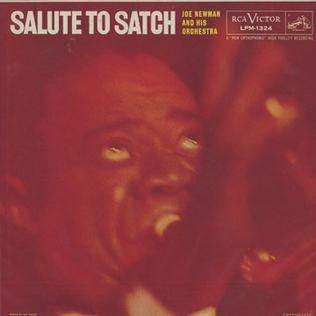
Salute to Satch is a tribute album to Louis Armstong by jazz trumpeter Joe Newman and His Orchestra recorded in 1956 for the RCA Victor label.
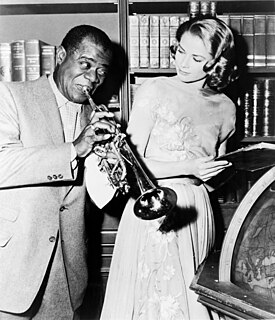
The collaborations between Ella Fitzgerald and Louis Armstrong have attracted much attention over the years. The artists were both widely known icons not just in the areas of big band, jazz, and swing music but across 20th century popular music in general. The two African-American musicians produced three official releases together in Ella and Louis (1956), Ella and Louis Again (1957), and Porgy and Bess (1959),. Each release earned both commercial and critical success. As well, tracks related to those albums have also appeared in various forms in multi-artist collections and other such records.


